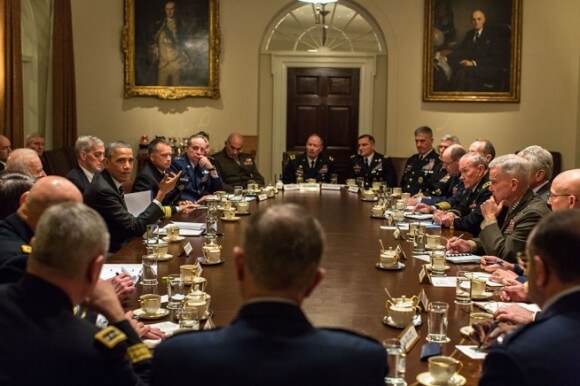
As John Kerry goes to Capitol Hill to beg Congress not to impose further sanctions on Iran, here’s a wrapup of responses to the breakdown in the Geneva talks.
The Israel lobby is split. Dovish Israel supporters like Tom Friedman, Americans for Peace Now, and J Street are backing the Obama administration, with J Street warning, “organizations that claim to represent the American Jewish community are undermining [Obama’s] approach.”
But the hardline Israel lobby is flexing its muscle. The ADL has issued a shockingly harsh statement that seems to brag about its dual loyalty, saying that Abe Foxman has given “a series of media interviews in Israel,” criticizing the Obama administration– 2 weeks after Obama had him into the White House and Foxman agreed with the White House line. And in the same statement, Foxman blasts Secretary of State John Kerry’s “moral preaching to the Israelis on the Israeli-Palestinian issue.” Has Foxman gone too far?
Obama press secretary Jay Carney says the alternative to a deal with Iran is “military action.” Makes your hair stand on end. From yesterday’s briefing:
the best way to ensure that Iran does not acquire a nuclear weapon is to achieve an agreement through diplomacy — an agreement that’s verifiable, that’s transparent, and that requires Iran to take concrete steps.
The alternative is military action. The President has never taken any option off the table, and he does not now and will not. But it is his responsibility as President to pursue a diplomatic opening, to see if it is possible to resolve this issue peacefully.
NJ Senator Robert Menendez, a Democrat, has been the main water-carrier for Netanyahu, calling for tougher sanctions on Iran, and defying a Democratic White House.
Trita Parsi, on behalf of the National Iranian American Council, sent out this email today describing the “ominous influence” of AIPAC:
Netanyahu and groups like AIPAC know they can set the U.S. back down the path to war by killing the talks with more sanctions.
NIAC is working to stop them from sabotaging the last best chance at peace.
But we need your help to counter their ominous influence.
Parsi at CNN says that Netanyahu played French Foreign Minister Laurent Fabius to get details of the deal and then nutmeg John Kerry:
much to the dismay of the other diplomats involved, Fabius broke protocol and announced both details of the talks and the failure to reach a deal before U.S. Secretary of State John Kerry had a chance to address the media. Fabius, echoing the objections of hard-line Israeli Prime Minister Benjamin Netanyahu, argued that Iran would get too much in the proposed deal. But in reality Iran was only offered modest sanctions relief in return for some significant suspension of aspects of its nuclear program.
Writes a friend in response:
It looks as if the French neoconservatives (Levy, Kouchner, Fabius, Sarkozy–and evidently Hollande continuous with the others) have picked up where the Americans left off. Remember from Mearsheimer-Walt: the Israelis in 2002 wanted an attack on Iran; didn’t see the point of Iraq but were willing to humor their American friends (and do their crisis-mongering bit on the news shows) for the sake of the attack on Iran which they were promised would follow. They’ve never really stopped.
Tom Friedman in the Times has the temerity to say that US interests and Israeli interests are different re Iran. Though he describes the lobby as being a lobby of Israel and Saudi Arabia and the Gulf States:
But there is something else that goes without saying, but still needs to be said loudly: We, America, are not just hired lawyers negotiating a deal for Israel and the Sunni Gulf Arabs, which they alone get the final say on. We, America, have our own interests in not only seeing Iran’s nuclear weapons capability curtailed, but in ending the 34-year-old Iran-U.S. cold war, which has harmed our interests and those of our Israeli and Arab friends.
Hence, we must not be reluctant about articulating and asserting our interests in the face of Israeli and Arab efforts to block a deal that we think would be good for us and them. America’s interests today lie in an airtight interim nuclear deal with Iran that also opens the way for addressing a whole set of other issues between Washington and Tehran…
The lobby is splitting on this. The liberal Zionist organization J Street is supporting Obama on the deal and citing American Jewish polling by two-to-one in support of talks.
Tell Your Senators: Don’t Undermine Iran Negotiations With New Sanctions
While 62% of American Jews support the way President Obama is handling Iran’s nuclear program, organizations that claim to represent the American Jewish community are undermining his approach by pushing for new and harsher penalties against Iran.
The outcome of the talks set to resume in Geneva on November 20 is far from certain, but new sanctions will definitively bring the process to a halt.
Hawkish organizations working to undermine a nuclear agreement are making their voices heard. Let’s make sure that the voice of the pro-diplomacy majority rings louder. Tell your Senators that now is not the time for new sanctions.
Now here’s that shocking statement from the ADL, in full. Note Foxman’s rationalization of turning against the Obama administration– because he’s now “reviewed some of the points of the tentative agreement.” Note his maundering — “Both the U.S. and Israel need each other at this pivotal moment, but do not seem to trust each other.” And his slam of John Kerry because Kerry dared to criticize the settlements:
New York, NY, November 11, 2013 … In a series of media interviews in Israel, Abraham H. Foxman, national director of the Anti-Defamation League (ADL), on Monday criticized the Obama Administration’s approach to the Iranian nuclear talks taking place in Geneva and called for the imposition of additional sanctions against Iran.
Referring to the October 29 meeting with Jewish leaders at the White House, Mr. Foxman said after that meeting he gave the administration “the benefit of the doubt” and agreed to refrain for a short period of time from urging the Senate to impose additional Iran sanctions as the U.S. and other nations pursued diplomatic efforts with Iran.
Now, having reviewed some of the points of the tentative agreement to be acted upon November 20 in Geneva, Mr. Foxman said he believes that, “We no longer have the luxury or the option to refrain from enacting additional sanctions against Iran.”
Mr. Foxman, who spent the last week traveling in Israel and holding a series of briefings with high-level Israeli leaders as part of an ADL leadership delegation, issued the following statement from Jerusalem:
After the White House meeting on October 29, I was among the few Jewish leaders to give the Obama Administration the benefit of the doubt in pursuing the diplomatic route and agreed to refrain from urging the Senate to impose additional sanctions for a short period of time to enable the U.S. to pursue diplomacy. I wanted to give the Obama Administration a chance to demonstrate that they could make real progress on this issue. But rather than leading Iran to make serious concessions, the Islamic Republic has used the perception of its willingness to negotiate with the U.S. and other nations in order to hold on to its right to enrich uranium while getting relief from some sanctions.
I was deeply troubled by several of the points in the tentative agreement which were reported in the past few days and may be acted upon in the next round of meetings scheduled for November 20 in Geneva. I am now convinced that this agreement will not only prematurely roll back the sanctions regime, but that it would legitimize Iran as a threshold nuclear state. I believe we no longer have the luxury or the option to refrain from enacting additional sanctions against Iran. The time has come for Congress, especially the Senate, not only to reconfirm and strengthen the existing sanctions, but also to begin to impose additional sanctions against Iran. Crippling sanctions have worked in the past and they have the greatest chance to succeed in getting Iran to agree to give up its nuclear weapons program.
Both the U.S. and Israel need each other at this pivotal moment, but do not seem to trust each other. The U.S. government’s leaking of information about Israel’s defensive military actions in the area, including actions in Syria and Sudan – not to mention Secretary of State John Kerry’s moral preaching to the Israelis on the Israeli-Palestinian issue – were counterproductive. Clearly, both countries share the same goals: regional stability, preventing Iran from developing nuclear weapons, and making progress with the Israeli-Palestinian peace process. But the strategy to get there is different. At times this creates tension between the two states when the strategy is emphasized over the goals.
Update: Peace Now’s Lara Friedman is also urging Americans to support the Obama administration in its negotiations:
Pursuing additional sanctions today sends a message that Congress doesn’t want a negotiated solution to Iran’s nuclear program. Indeed, legislating new sanctions will be understood by many, in Iran and the international community, as a declaration that Congress actively wants to scuttle the ongoing diplomatic effort. Such an approach will also bolster arguments that congressional sanctions and saber-rattling have been driven all along, not by the goal of changing Iran’s policy vis-à-vis its nuclear program, but rather by the goal of changing the Iranian regime.


what is remarkable is the trans-national reach of the israeli-saudi alliance in ts attempt to suppress Iranian energy production and exports for BP Aramco.Pat Buchanan hints of a treason ‘cabal’ and warns of domestic world gentile blowback:
Michael Cohen has a great piece just up on the Guardian:
http://www.guardian.com/comment-is-free/2013/nov/13/us-israel-relationship-strained-iran-nuclear-talks
About the new “Frenemies”
Just one line sings out loud:
“This week there was a genuine sunburst separating the two nations.”
Following the comments between Hostage and Shingo in the other threads has been interesting, what the various legal opinions of others amount to regarding the NPT are not of much consequence because the only opinion which matters is that of the US, and here is why.. Sherman claims that “It has always been the U.S. position that Article IV of the Nuclear Non-Proliferation Treaty does not speak about the right of enrichment at all [and] doesn’t speak to enrichment, period.” at the moment Iran cannot enrich uranium because of UNSC Resolution 1696, because it is the US position that Iran cannot enrich at all, then the UNSC will never be lifted since the US have veto power. Agreement is only possible if the US changes it’s policy on this crucial point.
Vietnam 3.0
I’ve always said:
The greatest failure of the left on cultural/identity issues is the failure to weed out ethnic non-white(non-Gentile/Christian) nationalists who only use liberalism as a shield for their own malevolent and often violently racist instincts.
Abe Foxman is in many ways a precursor to this phenomenom. He uses liberal language, but deep down he always comes down on the side of Apartheid and the settlers. He doesn’t even want them to be criticized! He’s liberal on issues as long as the oppressors are not Jews, and that’s not liberalism. He chooses liberalism because as a minority, it benefits him. But when his group is in the majority, he turns into an outraged defender of Apartheid.
And he’s not alone on this hypocrisy, but the left has generally failed to be tough on these racists internally and the results are open for all to see.
And it’s also one of the reasons ‘PEP’ exists.